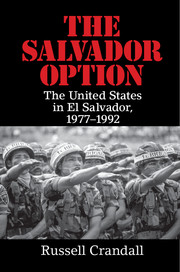Book contents
- Frontmatter
- Dedication
- Epigraph
- Contents
- List of Figures
- List of Organizations
- Acknowledgments
- 1 Introduction
- PART ONE EL SALVADOR IN THE COLD WAR
- PART TWO JIMMY CARTER
- PART THREE RONALD REAGAN
- PART FOUR GEORGE H. W. BUSH
- 39 Elusive Justice
- 40 Pessimism
- 41 Bush Arrives
- 42 Bush, Cristiani, and the 1989 Vote
- 43 Guerrilla Second Final Offensive, November 1989
- 44 Jesuit Killings
- 45 SAMs
- 46 United Nations and Peace
- 47 Demobilization
- PART FIVE POSTWAR
- Notes
- Bibliography
- Index
41 - Bush Arrives
from PART FOUR - GEORGE H. W. BUSH
Published online by Cambridge University Press: 05 June 2016
- Frontmatter
- Dedication
- Epigraph
- Contents
- List of Figures
- List of Organizations
- Acknowledgments
- 1 Introduction
- PART ONE EL SALVADOR IN THE COLD WAR
- PART TWO JIMMY CARTER
- PART THREE RONALD REAGAN
- PART FOUR GEORGE H. W. BUSH
- 39 Elusive Justice
- 40 Pessimism
- 41 Bush Arrives
- 42 Bush, Cristiani, and the 1989 Vote
- 43 Guerrilla Second Final Offensive, November 1989
- 44 Jesuit Killings
- 45 SAMs
- 46 United Nations and Peace
- 47 Demobilization
- PART FIVE POSTWAR
- Notes
- Bibliography
- Index
Summary
Eight long years of political terror have turned this country into the Northern Ireland of Central America.
– James LeMoyne, New York Times correspondent, 1989There is no one in Salvador who does not recognize that D'Aubuisson is the best politician in the country.
– William Walker, U.S. Ambassador, 1989Winning the November 1988 presidential election against Democratic challenger Michael Dukakis, Reagan's two-term vice president George H. W. Bush assumed the presidency in late January 1989. Bush's foreign policy team might have had a reputation (a considerable chunk of it self-described in subsequent memoirs) as pragmatic, but it was effectively as hawkish as the Reagan administration in its global outlook, especially vis-à-vis Moscow. In the words of Bush and National Security Advisor Brent Scowcroft: “The biggest thorn in U.S.-Soviet relations remained Central America, where the Soviets still supported their client Nicaragua and, through it and Cuba, the guerrillas in El Salvador.…[While] the Soviets may have ceased supplying weapons, the Cubans and East Germans had stepped in to replace them. When challenged, the Soviets complained that Castro was beyond their control.”
Despite these concerns, however, the incoming Bush team was eager to bolster the White House's relations with Capitol Hill over Central America policy. For incoming Secretary of State James Baker, the ongoing war in Central America was kryptonite to domestic politics and an “obstacle to the continued growth of democracy in all of Latin America.…Without doubt, it was my first priority.” To these ends, Bush's Central America policy emphasized pragmatism and compromise over conflict and principle. The new administration meant “the ball [was] back in Washington's court, in part because key Central American leaders [believed] that Bush [would] give more serious support than Ronald Reagan to negotiated solutions to their decade-old crisis.” At this time it was really Nicaragua as opposed to policy in El Salvador that was the true political thorn for the Bush administration's “Central America” policy. For instance, an article in the New York Times published shortly after Bush's election in 1988, titled “Bush Aides Speak of New Policy of Diplomacy in Central America,” homed in on engagement in Nicaragua, with no mention of El Salvador.
“Merited Serious Consideration”
Having spent two terms as Reagan's vice president, Bush was well versed in the evolution of policy in El Salvador.
- Type
- Chapter
- Information
- The Salvador OptionThe United States in El Salvador, 1977–1992, pp. 415 - 420Publisher: Cambridge University PressPrint publication year: 2016



